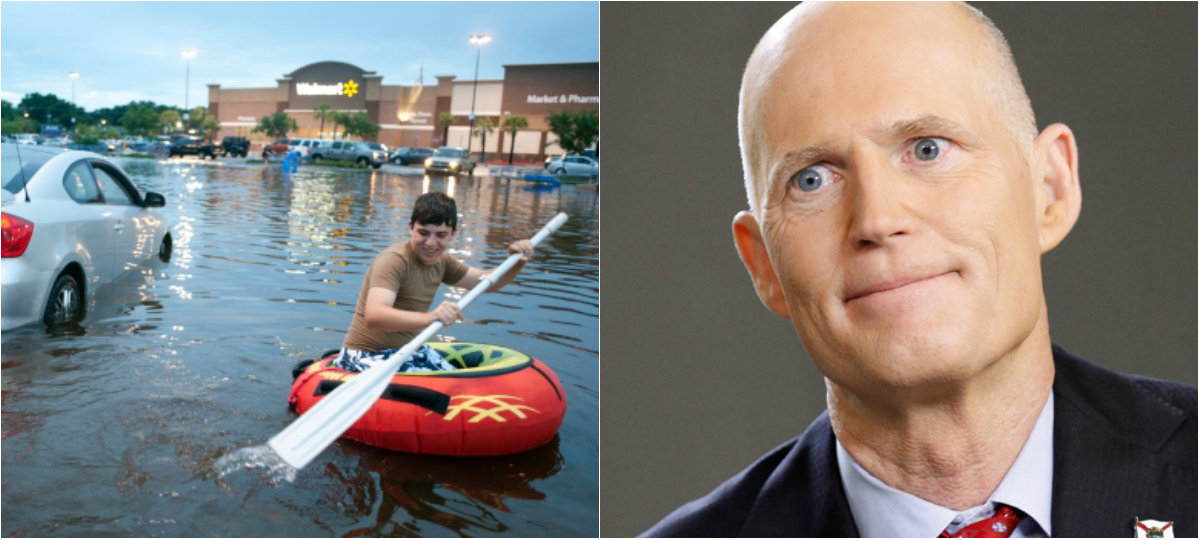Support strong Canadian climate journalism for 2025
Florida Governor Rick Scott's alleged 'ban' on words like "climate change" might just be stifling the state's ability to prepare for extreme weather events, said Tristram Korten, the journalist who broke the news on Scott's now-infamous unwritten policy.
Korten found that staff, volunteers and contract workers for Florida's Department of Environmental Protection were discouraged from mentioning terms like "climate change" and "global warming" since Scott took office in 2011.
"We need to know if this policy about words is affecting the government's effectiveness," said Tristram Korten, the reporter who first broke the story in the Florida Center for Investigative Reporting.
Korten said he sensed in his interviews with Florida state staff that a "chill effect" is slowing down the government's actions on preparing for potential climate disasters. Government employees are working on climate preparedness projects, he said, but they're afraid to call it by name "because they fear it will call attention to it, and it will be defunded."
Governor Scott's spokesperson Jeri Bustamante denied that there was any ban referring to climate change or global warming.
"This is not true. Any allegations [about the Governor] are not true," said Bustamante. She said there was "no policy in place" banning staff from talking about climate.
Asked if Governor Scott believes in human-caused climate change, she said she could not comment further.
"Uninsurable" due to climate change
Florida has long been known as one of the most vulnerable locations in the U.S. for rising sea levels and storms.
The state of Florida, along with parts of the U.K., are highlighted in a new Geneva Association report as being potentially "uninsurable" due to rising risk and decreasing self-protection. Recently, a major insurance company sued the city of Chicago, alleging that the city knew about increased rainfall caused by climate change, yet failed to prepare for property damage.
While Florida's situation is unusual, Canada's federal government has also taken measures to take climate change out of public debates in recent years. After pulling out of the international Kyoto Protocol on climate, the federal government changed National Energy Board rules so that intervenors can't talk about climate change in pipeline review hearings. Federal Conservative MP James Lunney recently took to Twitter, disputing scientific evidence of climate change, as well as evolution.
Korten said he didn't know why some politicians like Governor Scott were motivated to stifle discussion of climate change, but that it seemed to be linked with their broad alignment with oil and gas companies.
"We have a majority of the Republican politicians in this country at the national level — and apparently city level — who just don’t want to mention these words (climate change). And they’ve voiced their skepticism about this. Of course, they're more aligned with energy companies."
"The industry in general is probably scared," aid Korten. "To accept that [climate change] is man made and we have to do something about that means, at the most obvious level, a carbon tax, and they’re terrified of these."
He said climate denial was nevertheless becoming an increasingly "untenable" position to take, given the scientific consensus and broad public support for policies to mitigate it.
A slow disappearance of "climate change" mentions in documents
Korten said Scott's policy appeared to be a "porous" one that wasn't implemented all at once.
The year before Governor Scott was elected, he found 209 references to climate change in PDF documents on the Department of Environmental Protection website. "Every year, it went down by a wide margin," Korten said. "Last year, there were 34 mentions and all of them were from different agencies, like the Fish and Wildlife Commission... This year, there's been no mention so far. Clearly, something is going on."
Scott's office was asked for comment on the documents, but declined to respond on record.
Governor Scott's "Keep Florida Working" recommended 2015-2016 budget does recommend some measures to address rising sea levels, including $50 million for the Stan Mayfield Grant Program for waste water projects in the Florida Keys, $30 million for land acquisition by Florida’s Water Management Districts and $1 million for Florida’s Coastal Zone Management Program. The document did not mention climate.



Comments